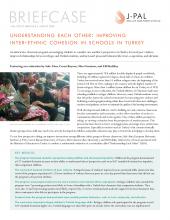Understanding Each Other: Improving Inter-Ethnic Cohesion in Schools in Turkey
An interactive classroom program encouraging students to consider one another’s perspectives in Turkey lowered peer violence, improved relationships between refugee and Turkish students, and increased prosocial behaviors like trust, cooperation, and altruism.
Key Results
The program improved students’ perspective-taking abilities and decreased impulsivity: Children in the program demonstrated a 0.27 standard deviation increase in their ability to understand others’ perspectives and were 0.07 standard deviations less impulsive than comparison children.
The curriculum lowered incidents of peer violence: Perhaps because of students’ improved socio-emotional skills, classrooms that received the program experienced 1.23 fewer incidents of violence between peers in a ten-day period than classrooms that did not use the program (a 65 percent decline).
The program encouraged students to be more inclusive and reduced ethnic segregation: Refugee children who attended the program were 7 percentage points more likely to form a friendship with a Turkish host classmate than comparison students. They were also 12 and 10 percentage points more likely, respectively, to receive emotional and academic support from host classmates than their counterparts who did not participate in the program.
Students from the program demonstrated more socially positive behaviors, such as trust, reciprocity, and altruism.
The curriculum improved refugee children’s Turkish language skills: Refugee children who participated in the program scored 0.14 standard deviations higher on a Turkish language test than their peers in schools where the curriculum was not implemented.
